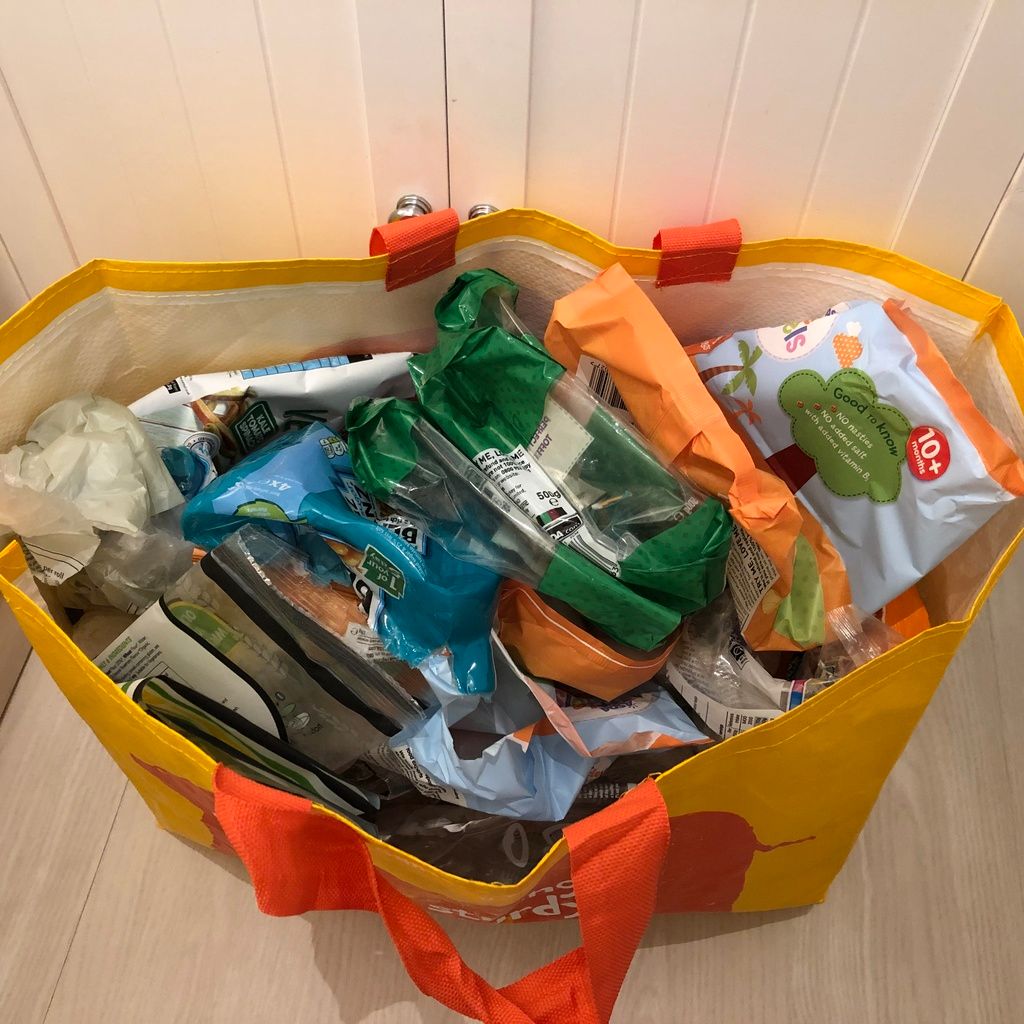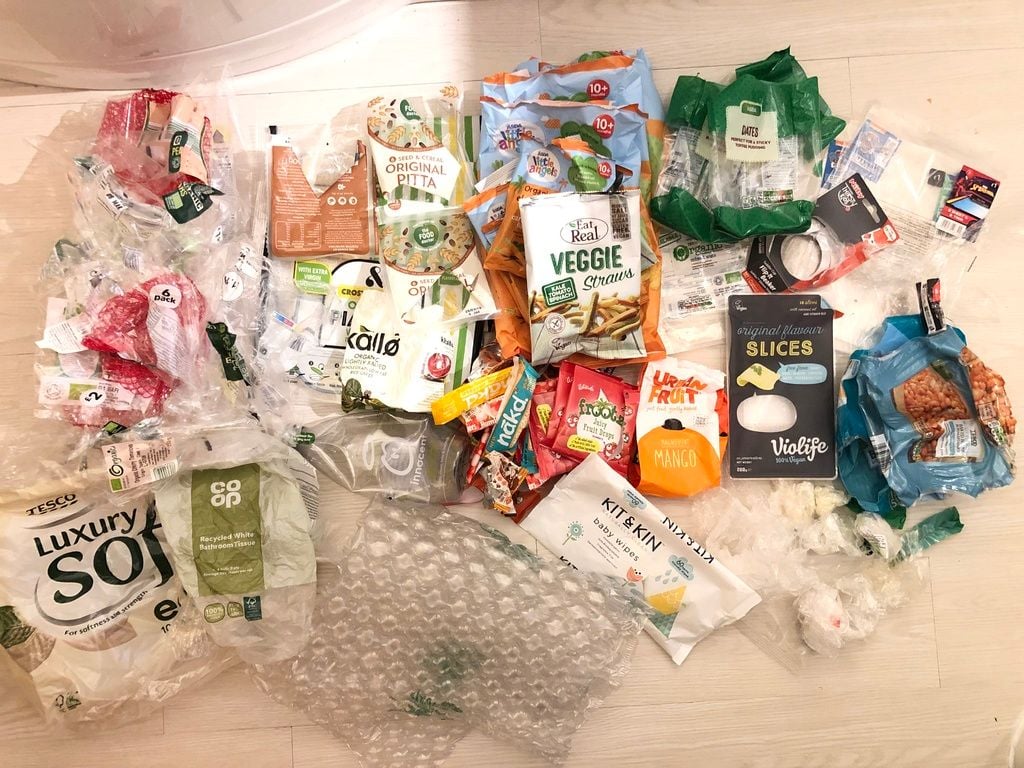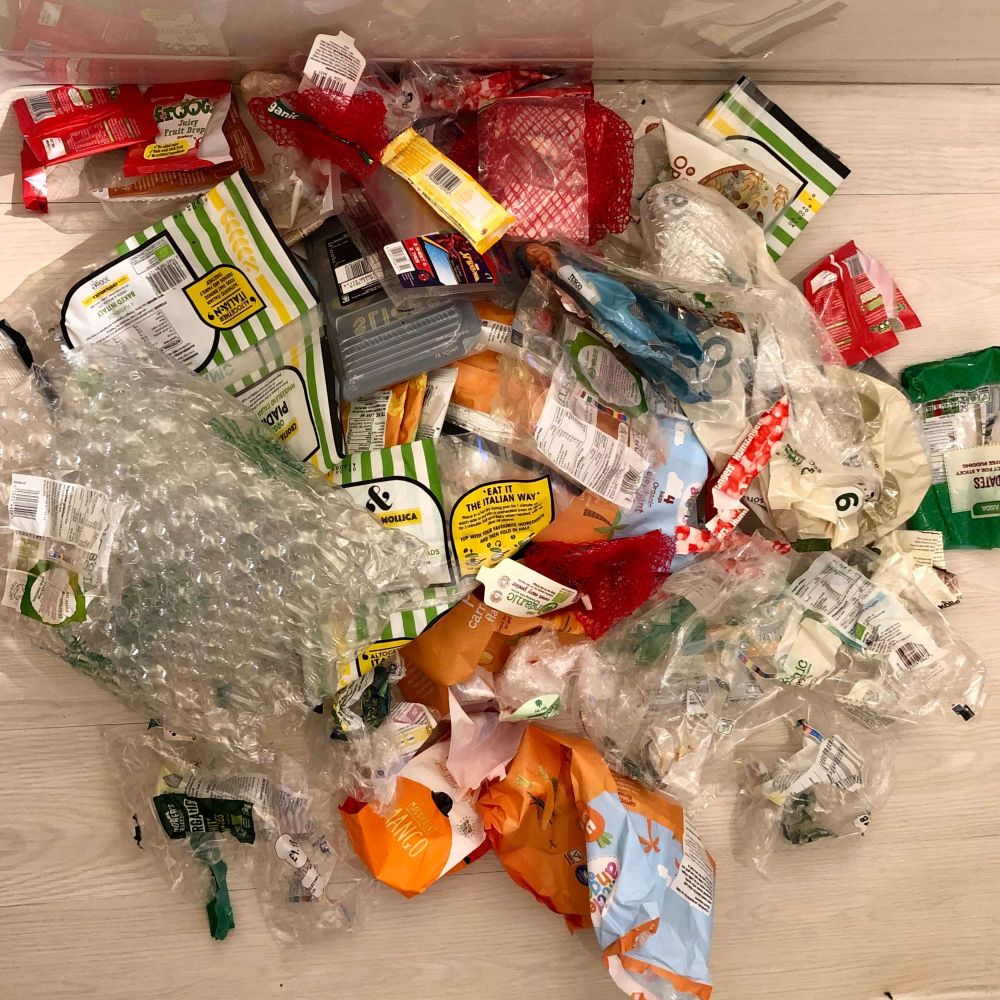How much single-use plastic do you use in a week?
Posted on
Collaboration with The Midcounties Co-operative 1Change campaign – all words and opinions my own.
Plastic is big news at the moment. We are the first generation to know the devastating effects that our technology and everyday habits are having on the environment and the planet we call home. Unfortunately with plastic, it’s not good news.
We have all seen the news stories, YouTube clips and documentaries telling us why single-use plastic is bad. This once revolutionary man-made product is now littering our oceans, clogging up rivers, killing animals and even poisoning us.
Many of us, especially the more eco-conscious among us, might not like to admit it, but plastic is unfortunately a big part of our everyday lives. Just look around your home and even where you are sat right now and see what is made from plastic. I bet you’ll begin to realise that it’s everywhere.
Of course, we have come to rely on plastic and its multitude of uses and it’s not going to disappear anytime soon. The big problem that we can begin to solve, however, is single-use plastic. These are plastics that are only used for one purpose and then discarded. There are a lot of them and we all use them every day. Once you begin to realise how much you do use, it’s really shocking to think about how much plastic is thrown away every day across the globe.
How much single plastic does my family use in one week?
I decided to take part in a challenge by The Midcounties Co-operative who is launching a campaign called 1Change to demonstrate what it is doing to reduce single-use plastics. It is also hoping to get customers, employees and co-operators on board to join the fight in reducing single-use plastics.
The challenge was to save up an entire week’s worth of single-use plastic to see how much we use. We’ve made quite a few changes over recent years to help reduce the amount of plastic we use and to be more eco-friendly as a family, but I was still shocked by the amount we had used and were therefore throwing straight into the landfill.
So, here goes. We managed to fill up one big shopping bag with the loose plastic as we collected it:

And here it all is laid flat so we can see what it is:

The single-use plastic a family of four throws out in one week
I was pretty shocked at the amount of this plastic when it was all laid out. It looks like so much, yet I know it’s not even going to be half as bad as some families of four. We make a lot of our own home-cooked evening meals, lunches, snacks and even use plant-based milk so this really reduces the amount of plastic we use each week. We also only usually drink water, tea and milk so we don’t usually have plastic bottle waste.
This week we didn’t make any of our own energy balls as we’d ran out of dates and our local shop doesn’t sell them, so there are lots of snack packets instead from all of our lunchboxes and snacking. You can see we did buy several packs of dates at the end of the week, so we can now make some more of our own snacks which will reduce our single-use plastic waste.
Here is a list of our plastic waste and my thoughts:
· Toilet roll wrappers
Recently our local supermarket had recycled toilet roll that was wrapped in paper packaging and I purchased a few. Then when I went back a week later it was gone! I wonder if they were trialling the brand, but they should definitely stock it again. If there is a more eco-friendly option then I would much rather purchase it. I’ve also considered a bidet toilet before which could totally eliminate the need to buy toilet roll. For now the best way to reduce the amount of plastic is to buy the largest multipacks possible.
· Fruit and vegetable wrappers
We eat organic food and I always feel guilty about the amount of plastic it comes in. If you don’t eat organic then you can choose to buy loose fruit and vegetables which is usually a cheaper option too. This will reduce your amount of plastic. I’m going to order more fruit and vegetable boxes and we actually have organic vegetable boxes coming for the next three weeks as I saw a great online offer. This will reduce our plastic. I hope the supermarkets will soon offer loose organic fruit and veg, or at least package them in plant-based wrap which I know exists.
· Bubble wrap from a delivery
Unfortunately many of us order online and are therefore not in control of the wrapping. There’s a shop I regularly order from and they send the products in so much unnecessary wrap as it’s not even a breakable product. I always send feedback every time as it’s such a waste of packaging and bad for the environment. If we all let our thoughts be known then hopefully it will begin to make a difference. This company could have used a paper wrap which would have been recyclable and environmentally friendly. I do always try to save packaging to re-use it and I hope the new recipient does the same.
· Wrap and pitta bread wrappers
We don’t eat loaves of bread as they are full of so many questionable ingredients, so we choose to eat wraps and pittas from companies that only use a handful of ingredients instead. This does mean we have wrappers from these weekly. In this case the companies really need to change their packaging. If you love bread you could make your own at home using a bread maker. These are easy options for the kids’ lunchboxes so I do buy these for the convenience. I also make pasta for their lunches which is a better option as that can be taken in reusable pots each day and creates less plastic waste.
· Crisp packets
We don’t buy crisps every week, but this week we did! I’ve seen some crisp packet recycling initiatives begin to take shape with recycling points popping up in stores. I’m really pleased this issue is beginning to be tackled. I still question why the crisp companies don’t use compostable packaging. I’ve purchased crisps in compostable packets before from small independent brands, so the big brands should really take note. This would be the ultimate solution.
· Dried fruit & nut packets
I’ve seen a shop in a nearby town that sells nothing in packets at all. You can take your own reusable tubs and pay per weight. I imagine a future where all the stores are like this. Like it used to be before plastic was invented!
· Baby wipe packet
I dread to think how many packets we got through when my children were babies. Now we get through one packet every 1-2 weeks, again for the convenience. They are easy to use for sticky fingers and faces when out and about. I make sure we buy eco-friendly wipes that are biodegradable, but these brand values don’t seem to extend to the packets themselves. We can use cloths and water at home to clean the children’s faces and we need to do this more.
· Cling film
I really don’t like cling film and I was researching it recently after discovering non-PVC cling film and the dangers of cling film with PVC. I decided to stop buying it, but we had two rolls in our draw to use up so I felt like it was better to use it up. I still feel guilty using it though and won’t be buying more once it’s gone. We tend to use reusable pots and very occasionally some foil which can be recycled. We don’t really need cling film.
· Baked beans wrapper
To avoid the baked bean wrapper we can buy single cans. Unfortunately the stores often discount the multipacks which come in a plastic wrapper – grr! Stores should start offering discounts on the more eco-friendly packaging options available to customers instead.
· Wrapping paper wrapper
This definitely isn’t normal for our weekly shop, but it was Reuben’s birthday and so I had purchased some wrapping paper and it was wrapped in a plastic film.
· Water bottle tag
Again, this is not normal, but Reuben’s milk bottle was lost at pre-school (we give him plant based milk to take). So Ben replaced it with a new one which annoyingly had a plastic hanging tag and a plastic mould over the lid. This packaging was totally unnecessary and a cardboard hanger would have sufficed. I hope companies start becoming more responsible with their packaging.
· Smoothie bottle
Ben purchased this when at work for the convenience. We do make a lot of our own smoothies and milkshakes at home which is definitely a solution to store bought ones. Plastic bottle waste is a big problem and perhaps it was the plastic bottle problem that first opened our eyes to the issue with plastic. I remember seeing a large sculpture in Bristol of a whale made from thrown away bottles. We don’t drink squash and choose to distil our water at home instead of buying bottled water like we used to. We also make our own plant-based milk, juices, smoothies and milkshakes. This change drastically reduced the amount of single-use plastic we used.
· Cotton bud swabs
Most of us use cotton swabs in our everyday lives and we use them weekly as part of our cleaning routines. But do you know that all these swabs end up in landfill waste and can even end up in the ocean? We have now converted to bamboo and organic cotton buds, but these still create a lot of waste, even if it’s not plastic. We should protect our environment from all of these single-use items and the most effective way is switching to reusable alternatives, like reusable swabs, which will fit into an eco-friendly beauty routine perfectly.

Though this pile looked like a lot, it squished down into half a 10 litre bin bag. We only have a small 10 litre bin in our kitchen as we really try to keep tabs on what we are throwing into landfill and how we can reduce our waste. Go back a few years and we were putting a full landfill wheelie bin out once per week. Now we only put ours out every six weeks and often it’s not even full. Still, it’s far too much waste and far too much plastic needlessly damaging the environment.
A rant about the problem of single-use plastics
The problem with many of these single-use plastics is that they can’t be recycled. They are wrappers and the like that aren’t collected in our recycling. This type of packaging really does irritate me as come on, it’s 2019 and it should not exist anymore!
Out of this heap we could only recycle two items in our council recycling bin – a plastic tray and a plastic bottle. It really does infuriate me; if crisp packets can be recycled then the councils should collect them and recycle them.
I know there are smaller independent companies who are using compostable packaging for crisp packets and inside cereal boxes. I’ve purchased these products before, but they are few and far between. I’ve also seen a male toiletry company that makes its tubes from sugar cane!
This is much more sustainable and it’s a shame that it’s only the tiny little companies are making the effort rather than the huge corporations who can afford to. The large brands really should be setting an example and leading the way.
I also think the governments should enforce these sustainable, biodegradable and alternative options to plastic packaging.
Join the fight against single-use plastics with 1Change
The Midcounties Co-operative has decided to take action in reducing the amount of single-use plastic that is consumed. They aim to develop sustainable cities and communities as well as protect life under water and on land.
Here are some of their targets:
- Ensure all its Co-operative Childcare Nurseries maintain eco school status
- Engage 50 partner schools in ‘plastic is not fantastic’ education and campaigns by 2022
- Engage 1000 members in taking action in its 2019 1Change campaign to reduce single-use plastics
- Reduce the overall waste it produces by 20% by 2022
- Maintain a 99% recycling rate
- Eliminate single-use coffee cups in stores by 2020
- Eliminate single-use straws and cutlery by 2020
- Allow customers to bring their own containers to its meat and delicatessen counters by 2020
- Remove all plastic bags across premium supermarkets by 2020, providing bag for life alternatives.
Co-op food stores in the Midcounties will be providing information to help shoppers make informed purchasing decisions around single-use plastics from 18th March 2019.
Check out my other articles on how to reduce plastic:
- How cutting back on plastic benefits your life and saves money
- 15 ways to reduce plastic consumption
- Plastic waste can be turned into roads (and 20 ways to reduce plastic consumption)
- Plastic is not fantastic – the dirty secret of where our recycling really goes
